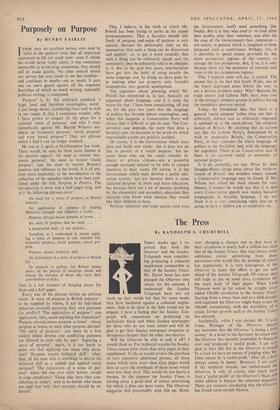There is always more to look at than one actually
sees, and Architecture of England by Bruce Allsop and Ursula Clark (Oriel Press, 9s. 6d.) is a beautiful little guide for the home tourist, full of telling pictures, diagrams and con- cise information.
ZULFIKAR GHOSB
Shiloh, 1862
What were their thoughts, lying in the orchard, clean from the cool creek water, under the glowing blossoms, waiting for the killing, for the trees to be bare, to be strewn with the petals of the mourning?
They are the young who have to die, to prove the quarrels of the old, are barefoot boys in cotton cloth are better dressed for dying than those more panoplied.
Did they see that there were brothers at the fence above the lane?
Through the carnage and the terror, beyond the pure necessity, did they glimpse the meaning in all that iron exchange of greetings?
R. D. FAU
Extraverts and Introverts
The Princess in England. By Michael Campbell. (Heinemann, 21s.) The Benefactor. By Susan Sontag. (Eyre and Spottiswoode, 21s.)
Notes from a bottle found on the beach at Cannel. By Evan S. Connell Jr. (Heine- mann, 25s.) The Three Sirens. By Irving Wallace. (Cassell, 25s.) Caravans. By James A. Michener. (Seeker and Warburg, 25s.)
THE two best novels this week, by Michael Campbell and Susan Sontag, are a curious con- 1rast. They both use, very effectively, an essen- ttallY 'literary' device, the story within a story, notebooks and all But Mr. Campbell's belongs to the English, humorous, extravert tradition, With undertones of high seriousness, while Miss Sontag's belongs to the more continental, earnest, introvert tradition, with undertones of humour. Mr. Campbell's 'I' is a down-and-out Irish author living in a London basement and trying to write a novel about his daily help, Mrs. Flynn, and her family. He has a deliciously Pirandel- lesque relationship with her, knowing that she reads his notes. She feeds him with information, he and fplse, and he knows that she knows that ne knows that she knows what they are both up to. Into this situation comes barging in the Princess, a tubby American lady of immense vitality, called ' Ujika Kutari, a princess of L‘ttnla-Ya by adoption, who wants him to ghost '1,er incredible life (torture, crucifixion and heaven knows what else) in the Far East. It is difficult to give any idea of this novel's 'roe flavour. The Princess is delightful in her ability, like a cocktail, to express a whole mixture of emotions at the sante time. The wry humour ajways goes against the 'author,' but when she ilnally leaves these shores we know that England W. ould have devoured her with its indifference, its endless amount of Not Minding, and yet the °nal lesson is more complex than that. One of the funniest and most moving novels I have read in a long time. The first forty pages of The Benefactor are moist off-putting in their apparent pretentious- ness- The 'I' is Elippolyte, a middle-aged man, Probably in Paris, who with dead-pan self- absorption tells us all about his childhood, up- bringing and then, oh dear, his dreams. But after while 'life,' if such it is, takes over, in a very ()r (id wHY. For he decides to act out the messages ,, his dreams, seducing—among others--Frau .-Tders, a bored lady who runs a salon, escaping %‘..ith her R) Morocco, where he sells her to an i‘rab. Indestructible, she turns up again, house, he murders her by setting fire to her .?use, but she tricks him and reappears. The :hole novel is a study in isolation, an extra- .41inarY exploration of the inner life, not for breams so banal as psychoanalysis, but as fact. Teams are acts. In the end it is not at all clear Wetter the `life' it part of it really happened. Written in a controlled, formal style, The Bene- factor achieves a strangeness and ambiguity that left me in a weird state of elation, like the vel'Y best poetry. ThHow different, then, is the real pretentious- ofss of Notes from a bottle . . . (etc.), 243 pages
4; be that is neither elating nor bad enough be amusing, agglutinated snippets about any- from Paracelsus . to Ras-Shamra, from Copernicus to the prepuce of. Jesus Christ or 'night in Alicante or the Bomb, with bits of alio. Spanish. etc. Sub-neo-Pound, without the



































 Previous page
Previous page